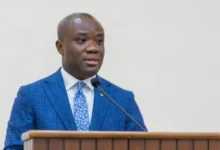Workforce must move to higher productivity—Dr Baah

The Secretary General of the Trade Union Congress (TUC), Ghana, Dr Yaw Baah says the country must work to move majority of its 13 million workforce from a low productivity service sector to a higher one like manufacturing.
This type of development module, he said, was the one employed by advanced countries in Europe and should be replicated here to help achieve the economic transformation envisioned by the Ghana Beyond Aid (GBA) agenda.
Speaking at a virtual forum on COVID-19 and GBA in Accra yesterday, he said economic growth would be minimal with only eight per cent of the workforce in the manufacturing sector and 49 per cent in the service sector.
The forum, organised by the GBA committee was on the theme “COVID-19 and our march towards Ghana Beyond Aid; turning adversity into opportunity”.
It was aimed at stepping up public education and social mobilisation towards achieving the vision.
Explaining the European example of economic transformation, Dr Baah said they used a model in which they moved workforce through agriculture to industry and then the service sector.
“But in Ghana, we have moved large chunk of people from agriculture straight to service sector. We have skipped the industry sector. The industry is the chief provider of jobs”
“That is how we have missed the transformation of our economy and this is the time to change under the GBA. We have to move a chunk of our workers from the low producing informal sector to higher production informal sector”, he said.
According to the TUC boss, the country’s struggle against colonial masters did not end with the attainment of independence, rather it was the beginning of the strife to coordinate her own socio-economic development.
On the COVID-19 pandemic, he said, it had shown the country that the GBA was “indeed appropriate and timely. The GBA vision should be our guide in our efforts to move over the pandemic”, he said.
The Senior Minister, Yaw Osafo-Maafo, in a brief address, described the GBA vision as relevant to the country’s development adding that “if Ghana is to become self-sufficient, it is now.”
Metropolitan Archbishop of Cape Coast, Archbishop Charles Gabriel Palmer-Buckle, made a strong case for a paradigm shift in mindset and attitude to achieve the vision because the country was losing sight of its values and virtues.
He said Ghanaians needed to commit to the values of honesty, transformation, handwork, systematic and patriotism and move from cynicism, mistrust and selfishness, which he said was more dangerous than corruption.
BY JONATHAN DONKOR







